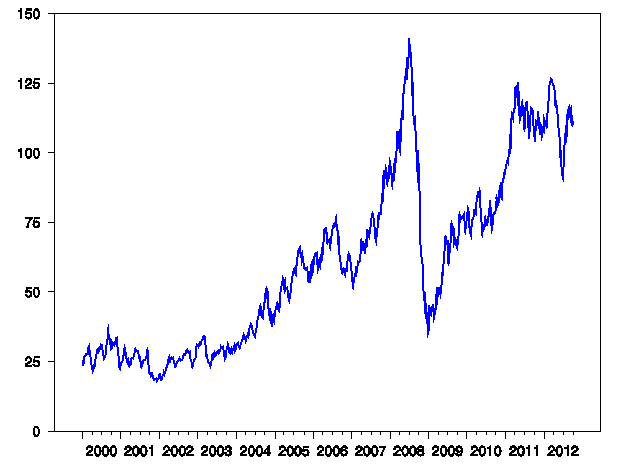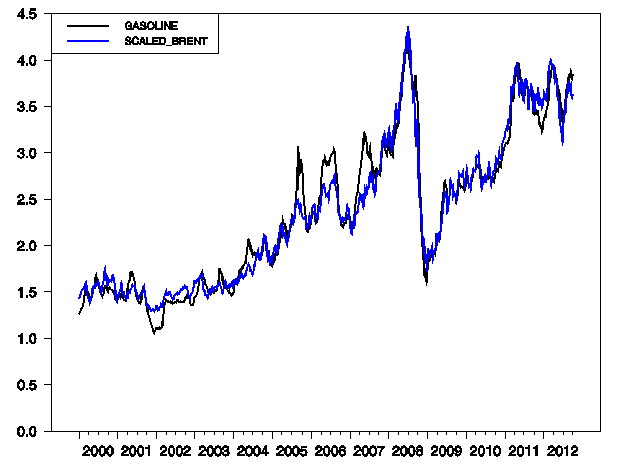Here I offer a few reactions to some of the comments that President Barack Obama and Governor Mitt Romney made about energy policy in their debate last night.
Governor Romney: the proof of whether a strategy is working or not is what the price is that you’re paying at the pump. If you’re paying less than you paid a year or two ago, why, then the strategy is working. But you’re paying more. When the president took office, the price of gasoline here in Nassau County was about a buck eighty-six a gallon. Now it’s four bucks a gallon.
 |
Notwithstanding, the price of gasoline during Obama’s term in office has never been as high as it was in July of 2008. To suggest that the drop in price in the fall of 2008 was largely due to policies of President Bush is rather farfetched. President Obama had what I regard as the appropriate rejoinder:
President Obama: Well, think about what the governor– think about what the governor just said. He said when I took office, the price of gasoline was 1.80 (dollars), 1.86 (dollars). Why is that? Because the economy was on the verge of collapse; because we were about to go through the worst recession since the Great Depression as a consequence of some of the same policies that Governor Romney is now promoting. So it’s conceivable that Governor Romney could bring down gas prices, because with his policies we might be back in that same mess.
Moreover, if you look not at the price of gasoline in the United States, but instead the price of Brent crude oil traded in Europe, the picture looks remarkably similar to that of gasoline above.
 |
Indeed, if you multiply the Brent price by 0.025 (to make an approximate conversion of barrels to gallons) and add 84 cents (for the average U.S. tax and mark-up), the price of U.S. gasoline and price of European Brent look almost indistinguishable.
 |
Crude oil production from U.S. fields in 2011 was 5.7 million barrels per day, only 7.6% of the world total. It’s hard to see how one could claim that modest changes in U.S. production could make that big a difference for the world price of crude oil. And if you don’t change the world price of crude oil, you’re not going to change the U.S. retail price of gasoline.
Later in the debate, the President made the following observation:
here’s what I’ve done since I’ve been president. We have increased oil production to the highest levels in 16 years.
Total oil production can be measured in a number of different ways. If you look at just field production of crude oil plus lease condensate, the number has risen since 2008 but is still below the level achieved in 2001, as seen in the top panel of the figure below.
 |
The gains are more impressive if you include natural gas liquids (which are not currently a significant transportation fuel), biofuels (which have a huge energy requirement to produce), and refinery processing gain, as shown in the bottom panel.
Governor Romney responded to the President’s claims as follows:
Governor Romney: And the president’s right in terms of the additional oil production, but none of it came on federal land. As a matter of fact, oil production is down 14 percent this year on federal land, and gas production is down 9 percent. Why? Because the president cut in half the number of licenses and permits for drilling on federal lands and in federal waters.
 |
Actual production would follow new leases with a lag. Field production from federal leases was 300,000 barrels per day lower in 2011 compared with 2009, while field production on other lands was up 600,000, enough to compensate for the decline in production from federal leases and account for the modest increase in total U.S. field production since Obama became president.
 |
I agree with Governor Romney that the increase in U.S. field production since 2009 could not be attributed to policies implemented by the President, and that in fact the President’s policies slowed the increase relative to what it would have otherwise been. I also agree with the Governor that if the President did more to encourage domestic oil production, it would be helpful for the balance of payments as well as generate some additional growth in U.S. income and employment. But to give the impression that more aggressive federal leasing could bring the price of gasoline back to $2/gallon is somewhat ridiculous.
And of course trillion-dollar deficits don’t help.
Big deficits (and the Fed’s monetization of same) encourage speculators to buy commodities as an inflation hedge.
Yes, I agree with all this. I thought the whole cheap gasoline thing was a bit ridiculous. Frankly, I thought the entire debate was riddled with pre-packaged platitudes.
The trillion dollar deficits are the only reason income is not even lower and making lower gas prices useless.
As I said a year ago, destroy Asia and pump production back at home. Very much Rome vs. Carthage type situation.
We can continue to live in our suburban fantasy which the US can obviously can not move on from.
wow its easy to spot a obama supporter .only a libtard could use that logic on gas prices.keep drinking the cool-aid like brad delong.
“wow its easy to spot a obama supporter .only a libtard could use that logic on gas prices.keep drinking the cool-aid like brad delong”
If I had debated against Romney I would have explained to the crowd how extra oil exploration wouldn’t do a thing for “gas prices” as it would be all exported to China. I don’t even see much improvmeent from the balance of payments either.
I guess you are the “libtard” or whatever fantasy you created.
Is there evidence that producers sought new leases on federal lands during this period? The graphs of offshore production and “other field production” suggest that there is ample capacity to meet demand. The moratorium following the Deepwater Horizon spill is most likely for the offshore decline from 2010-2011 as well as the sharp increase in production from other fields during this period.
Which policies have kept crude oil production from growing faster? If I remember correctly, there was a rather big deal of an offshore oil well blow out and spill, and I think that a halt to permit approvals so that an assessment of the risks and prevention measures involved in deep sea drilling was entirely justified. Offshore gas drilling is no longer profitable because of another technology (fracking) that the president, while not doing much to advance, certainly hasn’t overburdened with regulation despite more than a little ongoing research about the environment risks involved. The interior department released lease rules for fracking on federal lands earlier this year, but there has been little interest not because of the rules but because of the geology. Excepting offshore, there just isn’t that much oil and gas to be had via federal leases.
Balance of payments cumulative deficit from importing oil is about $4 trillion.
At 8.9 million bbl/day imports and $92/bbl = $300 billion/year. Over 40 years current rates would result in $12 trillion balance of payments loss.
Total US market capitalization (2011) $15.6 trillion.
Ie BAU oil imports alone could lead to a loss of US financial sovereignty over the next generation.
Does people actually change their minds based on such ridiculous assertions? If you’re going to vote for Romney, you hear some value in the remarks. If not, you don’t.
As Obama pointed out, there are thousands of federal leases that are not being drilled. Oil companies are just sitting on them to keep anyone else from using them, hence the new use-it-or-lose-it policy.
No, the thing that Republicans are still in a snit about is that Obama had the audacity to actually bill BP for the Gulf cleanup and then impose a 6-month moratorium on Gulf deep-water drilling until safety procedures were reviewed. The moratorium affected 33 wells. That’s it, that’s what all the grousing is about.
Oh, and ANWR. There’s always ANWR.
“To suggest that the drop in price in the fall of 2008 was largely due to policies of President Bush is rather farfetched.”
I don’t think this is very farfetched. It seems clear that the large drop is a result of the crisis of 2008. And it is certainly not farfetched to suggest that this crisis is for a large part due to the policies of President Bush (or lack thereof). But where Romney is wrong is that a drop in the price of oil is much more a sign of policy failure than of success.
Both Obama and Romney jumped to their canned talking points rather than answering the man’s question:”…and we want to get a question from Philip Tricolla.
Q: Your energy secretary, Steven Chu, has now been on record three times stating it’s not policy of his department to help lower gas prices. Do you agree with Secretary Chu that this is not the job of the Energy Department?
PRESIDENT OBAMA: The most important thing we can do is to make sure we control our own energy.
So here’s what I’ve done since I’ve been president. We have increased oil production to the highest levels in 16 years. Natural gas production is the highest it’s been in decades. We have seen increases in coal production and coal employment.
MS. CROWLEY: Governor, on the subject of gas prices.
MR. ROMNEY: Well, let’s look at the president’s policies, all right, as opposed to the rhetoric, because we’ve had four years of policies being played out. And the president’s right in terms of the additional oil production…”
MS. CROWLEY: Mr. President, let me just see if I can move you to the gist of this question, which is are we looking at the new normal? I can tell you that tomorrow morning, a lot of people in Hempstead will wake up and fill up, and they will find that the price of gas is over $4 a gallon. Is it within the purview of the government to bring those prices down, or are we looking at the new normal?
PRESIDENT OBAMA: Candy, there’s no doubt that world demand’s gone up. But our production is going up, and we’re using oil more efficiently.
…
It looks like the moderator is the only person at the debate who comprehends the question and its implications. And she is not on the ballot!
But let me answer her. It is not in the purview of “free market” worshipers, as Obama and Romney seem to be, for them to set the price of gasoline for the citizens of the United States. That would have the free marketeers yelling Venezuela socialism (where the price of gas is $0.18 per gallon ($0.05 per liter).
http://www.csmonitor.com/World/Americas/2011/0913/World-s-cheapest-gas-Top-10-countries/Venezuela-0.18-per-gallon-0.05-per-liter
But how many billions of US treasure went to saving this country, Kuwait, from being annexed by Saddam?
http://www.csmonitor.com/World/Americas/2011/0913/World-s-cheapest-gas-Top-10-countries/Kuwait-0.84-per-gallon-0.22-per-liter
Are we the chumps to the elite’s common ideology?
Governor Romney’s pro-growth economic plan does not equal Bush’s. It is a sad comment on the state of economic literacy in this country that anyone would believe the insinuation that the Governor’s plan could in fact lead to a worse economy than President Obama’s. Here’s why. In his 4-year term, economic performance will rank 19th worst out of the last 20 despite having had the advantage of vast pent-up demand coming out of the deepest trough since the Great Depression and more monetary and fiscal stimulus than during any other peacetime period in this nation’s 236-year history. His four years were focused on social issues at the expense of growing the economy, whereas growing economy is the only way America can afford to fund the social programs!
At 8.9 million bbl/day imports and $92/bbl = $300 billion/year. Over 40 years current rates would result in $12 trillion balance of payments loss.
David, net petroleum imports have averaged just less than 8.0 MMbbl/day this year; the U.S. is now a net products exporter of about 1.0 MMbbl/day. In addition, U.S. production is rising strongly. The graph of field production above stops prior to the huge boom of 2012: since January, production has risen from 5.8 MMbbl/day to 6.6 MMbbl/day. U.S. production is likely to average about 6.1 MMbbl/day in 2012, and then post another gain of more than 0.5 MMbbl/day for Cal ’13. Demand is declining (more efficient transport sector; switch to natural gas), and the “crude intensity” of the petroleum markets is also falling (more NGLs, more biofuels, etc). All told, there is roughly no reason to think U.S. petroleum imports will result in a net BOP deficit of 8.9 MMbbl/day over the next 40 years.
Let’s be clear. Global oil production growth is coming from just three sources: US shales (fracking); oil sands; and Iraq. Obama opposed all of these. I would argue that these have not lowered oil prices, but they have supported US GDP growth.
There is no love lost for Obama in the oil patch, and the oil business expects a very different operating environment depending on whether Romney or Obama is elected.
With Romney, we know i) Alaska will be fast-tracked, ii) Keystone will be built, and iii) increased onshore and offshore acreage will be available for leasing.
I see Alaska–again, 1.4 mbpd at peak (8% of US oil consumption)–as the critical issue. It’s not a hard project to kill just with bureaucratic red tape. The administration is in a position, I think, to strangle the project without having to been seen doing so. Given the pace at which Trans Alaska Pipeline throughput is declining, such a stalling tactic could conceivably be enough to kill Alaskan oil production in its entirety–a swing of perhaps 15% of US consumption by 2022.
As the professor noted, what really counts is global supply and demand factors. And as a result of an average 17%/year rate of increase in annual Brent crude oil prices from 2002 to 2011 (and as noted US gasoline prices closely track Brent prices), US consumers already cannot afford to buy all of the output of US refineries, since we are a net product exporter.
As I have noted several times, the dominant pattern we have seen since 2005 is that the developing countries, led by China, have–so far at least–been consuming an increasing share of a declining volume of Global Net Exports of oil (GNE).
If we extrapolate the 2005 to 2011 rate of decline in the ratio of GNE to Chindia’s Net Imports (CNI), by the time that a child born this year, in 2012, graduates from high school, in 2030, the Chindia region alone would theoretically consume 100% of Global Net Exports of oil. I don’t think this will actually happen, but on the other hand, the rate of decline in the GNE/CNI ratio has accelerated in recent years.
And consider an 18 year analogy. The East Texas Field, the largest Lower 48 oil field, was found in 1930, and it was a critical source of oil for the Allies in the Second World War. By the time that a child, born in 1930, had graduated from high school, in 1948, the US was a net oil importer.
All of this of course does make rising domestic production very important, with the caveat, as noted above, that US consumers already cannot afford to buy all of the output from US refineries.
Regarding rising domestic production, for example Texas has clearly shown a significant increase in crude oil production, to a level well below the 1972 peak; however, there is an absolutely crucial difference between the runup to the 1972 Texas peak and the recent significant rebound in Texas crude oil production.
A major contributor to the 1972 Texas peak was an increase in production from old fields like the East Texas Field, as it hit its final (secondary) peak in 1972, and started a terminal decline in 1973. However, note that the updip wells, on the east side of the East Texas Field, in most cases were capable of making virtually the same amount of oil in 1972 that they produced in 1932 (in any case, the eastern wells above the Oil/Water contact would easily make their allowable in 1972).
In contrast, my guess is that at least 90% of the shale oil wells currently producing will be down to 10 bpd or less, or will be plugged and abandoned, 10 years from now.
Also, Texas has the longest recent history of intensive modern drilling and completion efforts in Shale Gas plays, and for example it resulted in a steady year over year increase in annual Barnett Shale gas production, through 2011.
However, overall Texas natural gas well production started declining in 2009, as rising gas production from the Barnett and from other shale gas plays could no longer offset the overall decline in Texas natural gas well production (Texas RCC data for Barnett and overall natural gas well production).
The very interesting question is once the shale gas players have materially slowed their drilling–which they have now done–will the industry ever again be able to fully offset the overall underlying decline, given the very high decline rates from shale gas plays? In other words, as Art Berman has noted, I don’t think that the industry has ever had such a high overall decline rate.
As noted above, the 2008 to 2011 Texas natural gas well decline, with a higher natural gas well drilling rate than we are presently seeing, is not encouraging for either the longer term US Shale Gas outlook or for the Shale Oil outlook.
JDH wrote:
President Obama had what I regard as the appropriate rejoinder:
President Obama: Well, think about what the governor– think about what the governor just said. He said when I took office, the price of gasoline was 1.80 (dollars), 1.86 (dollars). Why is that? Because the economy was on the verge of collapse; because we were about to go through the worst recession since the Great Depression as a consequence of some of the same policies that Governor Romney is now promoting. So it’s conceivable that Governor Romney could bring down gas prices, because with his policies we might be back in that same mess.
I’m sorry professor but this was an absurd response. It the logic behind this response was applied to other goods and services we would be seeing massively higher prices today than in when Obama took office.
This logic would say that gasoline prices would have risen during the Clinton presidency, then fallen during the Bush, only to rise again under the Obama years. That logic doesn’t hold with reality.
Gasoline prices fell during the Clinton years. The prices rose during the Bush presidency and they sky rocketed during the Obama presidency.
In truth the price of gasoline is only slightly influenced by the president if at all. The price of gasoline rises or falls on the weakness or strength of the dollar. Bernanke has more to do with the price of gasoline than any president.
Romney was wrong to imply that it was Obama’s fault, but Obama’s rationalization still doesn’t make sense. You have two men running for president and neither of them seems to have a clue when it comes to the price of gasoline.
Ricardo,
In my opinion, US consumers, and consumers in other oil importing OECD countries, are basically collateral damage in a global bidding war for post-2005 declining net oil exports.
US oil producers, and oil producers around the world, have responded to an average double digit increase in annual oil prices since 2002 by trying to increase their production as fast as possible.
After a rapid increase in global annual production from 2002 to 2005, in response to a doubling in annual global crude oil prices, we have seen a slight increase in global annual production from 2005 to 2011, in response to another doubling in annual crude oil prices, with a measurable decline in both Global Net Exports of oil (GNE) and in Available Net Exports of oil (ANE*).
As the US showed a significant increase in production from 2008 to 2011, the rate of decline in the GNE/CNI ratio (ratio of Global Net Exports to Chindia’s Net Imports) accelerated to almost 10% per year, versus 7%/year from 2002 to 2005. In other words, we were headed faster, through 2011, to the point in time that the Chindia region alone would theoretically consume 100% of GNE.
Absent a global recession (which is certainly possible, if not likely), I foresee more of the same for US consumers, i.e., we will continue to have to get by on a declining share of a declining volume of Global Net Exports of oil.
While currently rising US production will help–especially since it puts Americans to work producing a badly needed product–I doubt that it will do much to reduce rising gasoline prices (absent a global slowdown).
My view is the the discretionary spending side of the US economy will largely continue to get crushed, as we transition from an economy focused on “Wants” to an economy focused, out of necessity, on “Needs.”
*ANE = GNE less Chindia’s Net Imports
GNE = Net exports from top 33 net exporters in 2005, BP + Minor EIA data
“President Obama: Well, think about what the governor– think about what the governor just said. He said when I took office, the price of gasoline was 1.80 (dollars), 1.86 (dollars). Why is that? Because the economy was on the verge of collapse; because we were about to go through the worst recession since the Great Depression as a consequence of some of the same policies that Governor Romney is now promoting. So it’s conceivable that Governor Romney could bring down gas prices, because with his policies we might be back in that same mess.”
So the price is up because the economy is roaring? If that is so, then it seems to have started back up before his inauguration – when the seas were just starting to recede.
You can’t parody this man – he is a parody. Only three more months of this.
Ricardo Wrote:
“I’m sorry professor but this was an absurd response. If the logic behind this response was applied to other goods and services we would be seeing massively higher prices today than in when Obama took office.”
We can verify whether or not the price of other goods and services were affected similarly by the recession and increased during the recovery. The data exists. Look at any price metric you want. We are seeing “massively higher prices today than in when Obama took office.” Not because of policy (unless you want to credit ARRA), but because there is nowhere to go but up when you start so low. If anything, it’s proof of recovery. And….. the data:
http://research.stlouisfed.org/fred2/graph/?s%5B1%5D%5Bid%5D=PPIACO
The logic behind the response was solid. You can apply this to all other goods. Although the president’s response (i.e. “verge of collapse”) takes some reading between the lines, it’s logical.
Ricardo, you’re a regular on here. I’m surprised by how uninformed you sound in your post. You must have looked at a graph of prices for… anything in the last few years. What US economist can’t recall what the price of gasoline looks like at least back through the 70’s?
The price of gasoline rises or falls on the weakness or strength of the dollar.
This is demonstrably false. If this were correct, oil prices expressed in, say, euros would not change. Instead, oil prices have risen when expressed in terms of every currency in the world.
A really nice overview of the oil outlook from Jason Stevens of Morningstar. It’s all quality.
Bottom line: 4 mbpd in increased oil production through year end 2016 for a coverage universe of 28 of the leading IOCs, independents, and NOCs in the world. Add in the others, and you come out with 1.2-1.9 mbpd / year increased liquids production thru 2016, plus whatever the Saudis might care to add.
That’s not enough, and very tight at the lower end of the forecast.
http://morningstar.na.bdvision.ipreo.com/NSightWeb_v2.00/Handlers/Document.ashx?i=f63684959ac142cb94d7c1f0bbc4fb48
No one seems to be addressing Obama’s ancillary point, which was that we need to pursue a two-track strategy. Historically the price of oil does not reflect the fact that it is an exhaustible resource that should follow a Hoteling price model. Instead we get prices that reflect what we might expect from an inexhaustible resource. That strikes me as a rather large market failure. Like it or not, some day reality is going to slap us in the face and we will be hit with the mother of all supply shocks. The old farts on this blog (and you know who you are) don’t really care because it won’t be their problem. But others should care. Since voters won’t address the problem through higher energy taxes, we’re stuck with awkward, second-best solutions that have the effect of raising the price. Fuel taxes would be better and more effective, but what’s a President to do? One way or another we need to start weaning ourselves from oil. We can do it gradually or we can wait for a big shock. Tuesday night Obama explicitly argued for the development of alternative energy sources. What he left implicit was the need to modestly constrict oil supplies.
Romney’s energy plan is nothing more than a slicker version of “drill baby drill” and to hell with future supply shocks and to hell with greenhouse gases.
Slugs –
We need to run a three track strategy: i) more oil, ii) CNG, and iii) self-driving cars. The latter can well be green should you so choose.
We are currently in an oil supply shock. This issue hasn’t gone away. Read Jason’s piece, and from me:
– Peak Oil Economics (Oil & Gas Investor, Oct. 2009)
and
– Oil: What Price can America Afford?
These are primers on the topic.
If you like, I also have pieces on CNG as a transportation fuel and the economics on self-driving cars (see the Foreign Policy website).
am i the only one who thinks we should RAISE the price of gas, a lot ?
me personally, I have a good job, I’d ask for a 10 dollar a gallon raise, phased in over 12 years (that is about how long people keep cars that have any value), wiht equivalent tax on all other forms of enery except wind and solar and conservation that is net net a plus
why is this so controversial ?
its like cigarettes; profligate use of energy is bad, and we discourage it with taxes.
Steven Kopits I didn’t see your articles at the FP site’s current issue. In any event, I don’t think anyone is saying that we should just go cold turkey on oil exploration. For better or worse we’re stuck with oil as our primary transportation energy for a long time. My point is that consumers respond to economic incentives, and as long as craven politicians work overtime to prevent those incentives from really biting, then why should we expect consumers will adjust? Consumers are myopic. In order to get consumers to start conserving energy and adopting alternative energy source cars the government will have to raise prices at the pump.
I’m not seeing this supply side shock in oil prices. I suppose oil prices are sort of high relative to historical prices, but I don’t equate that with a shock. I’m looking out over a longer time horizon. For example, do you think that 25 years from now we can still be as dependent on oil as we are today? I don’t know if we’re at peak oil today, but I’m pretty sure we’ll be there by 2037. The year 2037 seems like a long way in the future, but the year 1987 doesn’t seem that long ago. Are we less dependent on oil today than we were in 1987? Maybe a little bit, but we’ll have to do a lot better in the next 25 years than we did over the last 25 years. How do you do that if politicians insulate consumers from correctly priced oil?
Slug,
I frequently refer to the ratio of Global Net Exports of oil (GNE*) to Chindia’s Net Imports (CNI). We have nine years of post-2002 annual GNE/CNI data. I have shown the declines in the ratio in three year increments, and I have shown when GNE would equal CNI, when the Chindia region alone would theoretically consume 100% of Global Net Exports of oil.
2002 to 2005:
Ratio fell from 11.0 to 8.9, a rate of change of -7.1%/year. At this rate of change, the ratio would approach 1.0 around the year 2036.
2005 to 2008:
Ratio fell from 8.9 to 7.0, a rate of change of -8.0%/year. At this rate of change, the ratio would approach 1.0 around the year 2033.
2008 to 2011:
Ratio fell from 7.0 to 5.3, a rate of change of -9.2%/year. At this rate of change, the ratio would approach 1.0 around the year 2030.
Note that the rate of decline in the ratio accelerated, at least through 2011.
The following charts shows global public debt versus the GNE/CNI ratio for 2002 to 2011:
http://i1095.photobucket.com/albums/i475/westexas/GNE-CNI_total-debt_PS1.png
My premise is that the oil importing OECD countries are trying to keep their economies going, in the face of declining supplies of Global Net Exports of oil, via massive deficit spending–financed by real creditors and by accommodative central banks.
*GNE = Top 33 net oil exporters in 2005, BP + minor EIA data, total petroleum liquids
Let’s assume that it is possible to at least makes things not as bad as they would otherwise have been if we recognize the reality of finite fossil fuel resources and if we especially recognize the problem of constrained Global Net Exports of oil (GNE).
Let’s assume you are on a commercial airliner, and the pilot starts a gradual descent for landing. As the plane approaches the runway, if the pilot is maintaining a safe rate of descent, in terms of feet per minute, you have a safe landing. If the rate of descent is too high, say several thousand feet per minute, it becomes a crash, instead of a landing.
Using the airliner analogy, recognizing the finite resources problem would be analogous a gradual descent for landing. Not recognizing the finite resources problem would be analogous to an airliner showing an increasing rate of descent, resulting in a crash. Regarding the ongoing decline in the GNE/CNI ratio, we are seeing the latter, an accelerating rate of decline, not the former, a steady, very slow rate of decline.
In other words, in my opinion, 99.9% of the population are like passengers on a plane discussing dinner plans for that night, oblivious to the fact that the airplane is showing an accelerating rate of decline, headed toward a near vertical dive into the ground.
Slugs –
electric cars: http://www.foreignpolicy.com/articles/2012/06/08/self_driving_car
Slugs –
The US is using as much oil as it did in 1977.
New car fuel efficieny is up something like 18% in the last four years. Jim had a post on this.
Steven Kopits Yes, but the world isn’t. And while US oil use is going down and oil does not represent as large of a junk of our economy as it once did, our dependence on that smaller junk is greater. The studies I’ve seen show that demand for oil is becoming even more inelastic. The way to make demand for a product less elastic is to offer a wider array of substitutes.
I think that Greece is a good example of what an uncontrolled crash of a “Wants” based economy looks like, and the following NYT item is a very good and very sobering article.
This is why I think that we need to focus on advocating for training of young people and retraining of older people–in vocational and agricultural skills–in order prepare them for the reality of our ongoing transition from a “Wants” based economy to a “Needs” based economy.
I also think that we need to consider an “Enemy of my enemy is my friend” approach, i.e., I think that Peak Oilers should seek support from people who, while they may not agree about Peak Oil/Peak Exports (although I think that the GNE/CNI data speak for themselves), they may agree about a desperate need to reform our educational system.
http://www.nytimes.com/2012/10/21/world/europe/amid-the-echoes-of-an-economic-crash-the-sounds-of-greek-society-being-torn.html?hp&_r=0
Amid the Echoes of an Economic Crash, the Sounds of Greek Society Being Torn
A recent interesting opinion piece in the Sunday NYT, with a very interesting graph:
Do Tax Cuts Lead to Economic Growth:
http://www.nytimes.com/2012/09/16/opinion/sunday/do-tax-cuts-lead-to-economic-growth.html?_r=1&ref=opinion
Each point on the following graph, taken from the above article, represents the average annual US economic growth per year over a five year period, starting at that point:
http://www.nytimes.com/imagepages/2012/09/15/opinion/15captial-graph.html?ref=sunday
Note the severe contraction in average five year growth starting in 2002. The author of this article attempts to link faster growth to higher tax rates and slower growth rates to tax cuts, with the peak five year average growth period being from early 1995 to early 2000.
However, the average rate of increase in annual Brent crude oil prices from 2002 to 2011 was almost 17% per year.
I think that the combination of the Bush tax cuts, massive deficit spending, financed by real creditors and massive Quantitative Easing (QE), were all necessary to keep the average five year rate of growth in GDP in the “Wants” based US economy after 2002 just barely above zero.
I believe there has been misunderstanding of cause and effect here. On the face of the data Brent Crude prices compared to gasoline prices per gallon it would seem that the main driver of gas prices is he crude oil price. However, the crude oil price is obviously driven by the world economic conditions such that in the recent global recession crude oil dropped 55 percent. It is further obvious that world economic conditions are affected by US economic conditions and the recent world recession was driven by the US recession. The cause of the US recession was in turn driven by US economic policy that being looser regulations on the financial industry. So we could say that recession was caused by poor economic policy enacted by an ill-informed political process which would include the then president Clinton signing the Gramm-Leach-Bliley act of 1999. So the president of the US (in 1999) is somewhat culpable for the drastic drop in oil price in 2008.
JDH: Should such a thing as an optimal rate of growth have any weight economic policy deliberations? I ask because booms such as the one occurring in jurisdictions blessed with the oil-rich Bakken formation (e.g., North Dakota) typically generate lots of negative externalities or uncontracted unpleasantness.
Hard running booms in rural areas can lead to increases in congestion, dust, noise, and in particular property and violent crime. Sexual assaults typically go up. Sometimes wages and material costs increase to the point that local processing is no longer profitable as is currently the case for bitumen upgraders in Alberta.
All this leads to a natural question: In order to accelerate progress towards greater domestic oil production, how many additional sexual assaults are you and fellow citizens willing to tolerate for X additional units of domestically produced energy?
Environmental issue-induced delays in new energy production act to slow development and reduce some of the uglier side affects of rip-snorting resource booms.